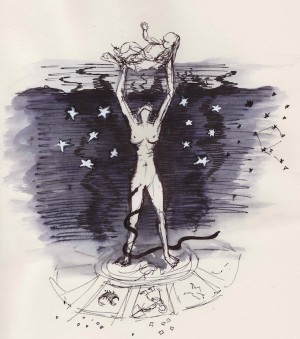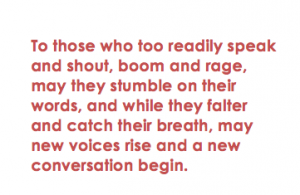A Woman’s Freedom: Ten Plagues, to the Tune of “I Wish I Knew How It Would Feel To Be Free" (For the Third Night)
This is the third in Zeek’s intergenerational Passover series of feminist plagues. We’re publishing a new one for each day of Passover.
What would it take for women to be free? All women — all ages, born as women, chosen to be women, or just born of a woman and know that the divine female is in us all and is calling to be liberated. What would it take for us all to be free?
I am writing this in a busy cafe, Nina Simone is singing serendipitously in the background, “I wish I knew how it would feel to be free.” You and me both, Nina….
The Ten Plagues of Egypt have been compared to birth pains, necessary contractions in order for a new nation to come to life. Transitioning from slavery to freedom, from being captive and defined by others to being independent and empowered to live — it is a painful process, for both the one giving birth and the spirit demanding life. And yet in the end, both society and those no longer constrained within society’s boundaries have the potential to forge new relationships. Freely chosen bonds of love, not entrapment within a system of power and control. Let my people go! But the fetus does not ask for permission to make the transition, it begins the birth process when its time is right. This can’t be resisted. It is inevitable. So let the process begin. What holds us all back, particularly but not exclusively women, needs to be felt by all society as the plagues that they are, so that all can know what it feels to be free.
Blood: The monthly cycle of renewal that causes our bodies to bleed, to hurt, to be aware of the passage of time and our frailty. We are not immortal, and every month we say goodbye to that month’s potential. Let all viscerally experience vulnerability, and be open about our weaknesses to find the strength that comes from accepting pain and loss.
Frogs: The frog in our throat that catches us when we try to speak and raise our voice. The marginalized who are silenced out of public discourse need to be heard. And to those who too readily speak and shout, boom and rage, may they stumble on their words, and while they falter and catch their breath, may new voices rise and a new conversation begin.
Lice: Too many of us experience discomfort in our own skin and bodies. The skin is the boundary between us and the world., This unease needs to be experienced by those who arrogantly assume that their worldview and experience are universal. May they be aware of their skin, their separation and subjectivity, and be willing to listen and learn from others.
Wild Animals: Animals roam the streets. Women tense up when walking past groups of men, anticipating cat–calling and other beastly behavior. Women need to unleash their inner wild animals, become the bitch that barks back, just for the moment it takes to tame the beasts and refuse to be the prey that is leered and sneered at. With tail between legs, may we find our human dignity together.
Cattle Disease: In ancient Egypt the domestic animals starved and wasted away. Today the ones who maintain the domestic environment are disrespected and dismissed. The cleaners, the mothers, the helpers, the carers who make life livable. If they all threaten to disappear, we would need to find the funds to pay them a decent wage, find polite words to speak to them, and learn to not dismiss their vital roles in society.
Hail: The hail was described as fire encased in ice. The intensities of heat and cold, together, too extreme. Women are told too often that they are overly passionate, too emotional. If only women spoke with more balance, and were nicer. But sometimes being extremely passionate is the only rational response. We need more fire in our bellies to fight on, and to be more icy, not accommodating, to those who want to keep us down by telling us to be nice.
Boils: We look in the mirror with a self-hating gaze. Girls learn they will be judged on appearance and not ability. And the appearance will never be good enough. We will never be flawless like a photoshopped image. May those who push unrealistic, limited ideals of beauty have their flaws revealed and not concealed, and may we learn that our blemishes make us perfectly human.
Locusts: The locusts came and consumed everything. Too often our consumption is based on wants and desires that were created to sell us products we don’t need. No matter how much we consume we will never find ourselves sated without understanding and articulating what we really hunger for, deep down, in our life. Stripped of all resources and comforts -— what do we really need, and what can we live without?
Darkness: In the cover of darkness the ancient Israelites took from Egypt the property as payment for the years of slavery. We base our love relationships on property exchanges, the veiled bride walks to the chupah in a ritualized commercial transaction. Ownership is asserted by claiming “she’s mine” or “he’s taken.” May we all be robbed of this sense of our lovers as our property. I am not my beloved’s, and they are not mine. I will stand with my lover, and hope that my lover will be with me. In unveiled, unchained, loving partnership.
Death of the Firstborn: We must let go of the power and status that are given as accidents of birth, be it gender, class, race, culture, sexuality, etc. May the firstborns be stripped of their sense of privileges, so we all are honored for who we are in our own merits, without hierarchies or comparisons. When society can be rid of this, then we are free to give birth to our liberated selves.
Nina Simone sings, “I wish I could be like a bird in the sky.”
But I don’t want to know freedom as a bird. I want to be able to feel free as a woman. I hope we all can be that free.
Jacqueline Nicholls is a London-based fine artist, and Jewish educator, who uses art to explore and challenge traditional Jewish ideas. Nicholls uses an amalgam of media — including drawings, print, embroidery, tailoring, paper-cutting, knitting, and more — to expand the Beit Midrash beyond its textual origins. Her current project, Draw Yomi, responds to the daf yomi cycle with a daily drawing that engages with the Talmudic texts. She also co-ordinates the Art Studio program at JW3, a new art and community venue in London, and is a regular contributor to BBC Radio 2 Pause for Thought.
Editor’s Note
This project was inspired, generally, by the 39th Annual Feminist Seder held this March at the home of Barbara Kane and the conversations we had there about creating more intergenerational spaces for feminists and social justice activists, and, specifically, by Letty Cottin Pogrebin’s reading there of “The Ten Plagues According to Women,” which appears here. Over the past few weeks, I reached out to Jewish feminists between the ages of 17 and 70-something, asking each to use the 10 Plagues as a point of departure. To redefine them or reflect on what each sees as today’s plagues, from a Jewish feminist perspective. Spread the word about this intergenerational Zeek series for Passover, featuring Letty Cottin Pogrebin, Chanel Dubofsky, Avigayil Halpern, Susan Lubeck, Jacqueline Nicholls, Sarah Seltzer, and Rabbi Elianna Yolkut.—Erica Brody
Hey, Zeek Readers! Be active participants in this conversation. Share your own list of modern-day plagues! Think about the themes that underlie or distinguish these plagues and respond in the comments! Share!
![[the current issue of ZEEK]](../../image/2/100/0/5/uploads/leftistethicistgraphic-52842c6a.png)
- 5000 Pages of Zeek
- Founded in 2001, Zeek was the first Jewish online magazine, and we have over 5000 pages online to prove it, all available free of charge. Read more in the Archive.
More articles by
Jacqueline Nicholls
More articles in
Faith and Practice
- To-Do List for the Social Justice Movement: Cultivate Compassion, Emphasize Connections & Mourn Losses (Don’t Just Celebrate Triumphs)
- Inside the Looking Glass: Writing My Way Through Two Very Different Jewish Journeys
- What Is Mine? Finding Humbleness, Not Entitlement, in Shmita
- Engaging With the Days of Awe: A Personal Writing Ritual in Five Questions
- The Internet Confessional Goes to the Goats



